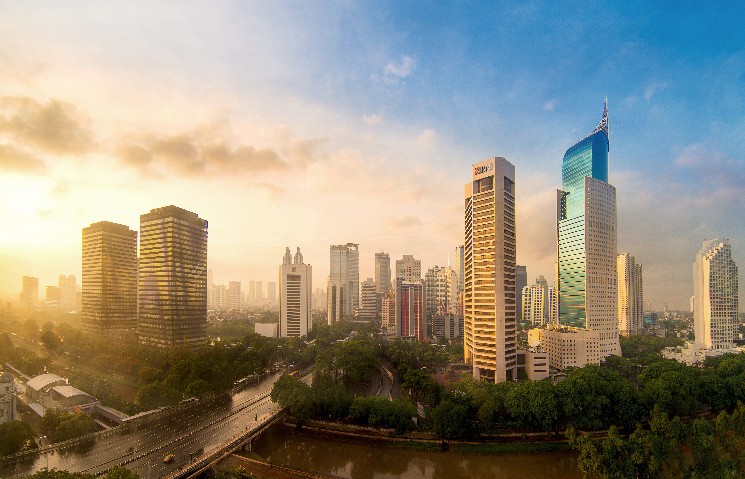Indonesia Has Global Plans for Local Crypto Tokens

If the Indonesian government is right, locally issued crypto tokens could one day join palm oil or coal among the southeast Asian country’s major export commodities.
While Jakarta takes an active interest in regulating the crypto industry, President Joko Widodo’s administration apparently sees merit in helping the local token economy grow – hoping to even benefit from taxing local digital assets that make it onto global trading platforms.
“Indonesia is looking forward to having a lot of commodities to be exported. And we can grab this opportunity to make crypto as one of the potential products for exports,” Jerry Sambuaga, Indonesia’s vice minister of trade, told CoinDesk in an interview.
For more local coverage of Indonesia, visit the new CoinDesk Indonesia website.
In Indonesia, the use of crypto as a currency for payments is forbidden under both local regulations and Islamic law – which applies to roughly 87% of the country’s 273 million people. Crypto assets, however, are classified as commodities in the country, lumped into the same category as things like grains or gold.
And thanks to a growing national love of speculative trading online, crypto is wildly popular in Indonesia, making it one of the most dynamic markets in the world.
According to Indonesia’s trade ministry, the country has more than 14 million crypto users, compared with nine million stock traders. The number of crypto traders as of March surged 300% from 2020, driven in part by a large unbanked population. Although the crypto bear market has slashed volumes traded globally, and the Southeast Asian nation was no exception, Indonesians have already traded 212 trillion rupiah ($14.3 billion) worth of crypto in the first half of 2022, trade ministry data reviewed by CoinDesk shows.
Read more: Indonesia Wants Citizens to Steer Local Crypto Exchanges: Report
Crypto as exports
In Indonesia, cryptocurrencies are classified as commodities and regulated by the country’s Commodity Futures Trading Regulatory Agency (Bappebti) under the Ministry of Trade. Bappebti works with the Blockchain Association of Indonesia (ABI), a trade group, to set up and maintain licensing rules for crypto assets and service providers.
On Aug. 1, Bappebti published an updated list of 383 cryptocurrencies– many of them globally traded digital assets like bitcoin and ethereum– that Indonesians are allowed to trade.
According to Sambuaga, Indonesia has big plans for locally issued tokens, as well. If Indonesia could foster and develop approved local tokens into “valuable products,” those tokens can be treated –and consequently taxed– as Indonesian commodities traded on global markets, he said.
Sambuga indicated local token issuers could also boost the country’s economy. He said these issuers have recently hosted events and run promotions in Indonesia and overseas, consequently bringing in “consumers,” “potential investors” and “stakeholders that would like to collaborate with local coin developers.”
Read more: Indonesia to Establish ‘Crypto Stock’ Exchange by 2022-End
That’s not to say, however, that it’s easy to get a local token on the coveted Bappebti white list for approved assets.
Agustino Wibisono, founder of the Indonesian crypto startup Sangkara, has been trying to get his token greenlighted by local regulators since last November. Without the approval, the token can’t be listed for trading on regulated crypto exchanges in the country.
“We hope we will get our license quite fast,” Wibisono said, optimistic that a recent venture capital injection in his startup will tip the scales in his favor.
Wibisono is one of many local entrepreneurs who are trying to get their tokens approved in order to list them on local exchanges.
Only 10 out of the 383 licensed tokens in Indonesia are local, Sambuaga said in August. Hopefuls like Wibisono have to go through a rigorous assessment conducted by the ABI before their tokens can be approved for trading.
Wibisono says he has been updating regulators about his startup’s operations on a regular basis since last December in the hopes of securing approval for his token. Earlier this month, CNBC Indonesia reported that a local token ASIX wasn’t approved for the white list, and will have to apply again.
The token assessment
To be able to trade in Indonesia, a digital token must be based on distributed ledger technology. It must also be classified as an “asset” or “backed asset,” because the use of crypto as a means of payment is forbidden under local regulations, as well as under Islamic law.
All local token issuers seeking a spot on the white list must also go through an assessment called the “analytical hierarchy process” (AHP), which is conducted by the ABI and Bappebti.
The ABI looks at the market capitalization of the asset, the exchanges it is listed on as well as the economic benefits and risks associated with the token and gives the asset a score before Bappebti reviews it.
“As long as it meets the criteria, then they could be included in the white list. So it’s a very open and very transparent method of creating a white list,” said Jay Jayawijayaningtiyas, the country manager of crypto exchange Luno, which is a member of the ABI. Luno’s parent company, Digital Currency Group, owns CoinDesk.
But this is where things get rough for local token issuers, according to Asih Karnengsih, chairwoman of the ABI. Karnengsih says new local tokens that haven’t been listed on exchanges or that are traded on only a few platforms aren’t likely to score high on the AHP test conducted by the association and crypto exchanges.
“The regulation is quite clear, but it’s not ideal yet. So what the association is trying to do is to help [regulators] to explore how we can make the process better, specifically to make sure the local projects can grow here in Indonesia,” Karnengsih said.
Indodax, which is one of the country’s largest crypto exchanges with more than 5.5 million users, has an easier time listing popular and global cryptocurrencies like bitcoin and ethereum than local tokens, according to co-founder and CEO Oscar Darmawan.
“But we believe that the situation will change because the government is saying that they will try to list as many local tokens as possible … so the crypto exchanges can trade localized tokens as well,” Darmawan said.
Through the AHP assessment, Indonesian regulators are allowing the industry to self-regulate to a certain degree. But self-regulation in the crypto world doesn’t have the best track record. Regulators in Japan have fallen out with an industry body– which perhaps led the world’s most prominent crypto self-regulation experiment– over management issues and delays in implementing anti-money-laundering regulations.
Karnengsih says Indonesia’s regulators are leaning on the ABI for assistance due to a lack of human resources, particularly with the technical knowledge of the crypto industry.
“They try to involve us a lot because, yeah, they don’t really have people who can actually really see the industry. So that’s why we do a lot of work,” Karnengsih said.
Local regulators also deploy other tactics to make the industry safer and more transparent for users. Recently, the regulator set up a help line called “Lini Bappebti” to respond to complaints and help with general requests for information on crypto assets. Bappebti has also increased monitoring and supervision of crypto traders and exchanges.
‘Open’
The recent market downturn has slashed the value of the average transaction on Indodax by half, but new users on the exchange are still growing at a steady rate, according to Darmawan.
“I think the appetite for the investors in Indonesia is still extremely positive. This is reflected in the number of people entering the crypto space. Obviously, it’s not as fast as 2021. But it’s still faster compared to the other industries,” Luno’s Jayawijayaningtiyas said, referring to the discrepancy between the number of stock traders in the country compared with crypto investors.
Sambuaga, the vice minister of trade, says the goal of developing local tokens is to eventually tax them, Indonesia taxes crypto investments at a far lower rate than some other Asian markets do. In Japan, crypto retail investors are taxed up to 55% for capital gains on crypto profits. By contrast, Indonesia implemented a 0.1% capital gains and value-added tax on crypto income and transactions earlier this year.
Read more: South Korea Plans to Tax Crypto Airdrop Recipients: Report
Darmawan says the tax is an effort to formalize crypto as a form of investment, as opposed to a restrictive measure.
“Indonesia is open for any kind of investment, collaboration, and we are seeing crypto commodities as one of the potential products for our potential exports,” Sambuaga said. “We are promoting our local tokens and we are happy, and let’s say we are certain that in the future, we will be one of the key players in crypto.”






 Bitcoin
Bitcoin  Ethereum
Ethereum  Tether
Tether  USDC
USDC  TRON
TRON  Dogecoin
Dogecoin  Cardano
Cardano  Bitcoin Cash
Bitcoin Cash  Monero
Monero  Chainlink
Chainlink  LEO Token
LEO Token  Stellar
Stellar  Zcash
Zcash  Litecoin
Litecoin  Hedera
Hedera  Dai
Dai  Cronos
Cronos  Tether Gold
Tether Gold  OKB
OKB  Ethereum Classic
Ethereum Classic  KuCoin
KuCoin  Cosmos Hub
Cosmos Hub  Gate
Gate  Algorand
Algorand  VeChain
VeChain  Stacks
Stacks  Tezos
Tezos  TrueUSD
TrueUSD  Dash
Dash  IOTA
IOTA  Theta Network
Theta Network  Basic Attention
Basic Attention  Decred
Decred  NEO
NEO  Synthetix
Synthetix  Qtum
Qtum  Ravencoin
Ravencoin  0x Protocol
0x Protocol  Zilliqa
Zilliqa  DigiByte
DigiByte  Nano
Nano  Holo
Holo  Siacoin
Siacoin  Numeraire
Numeraire  Waves
Waves  Ontology
Ontology  Status
Status  Enjin Coin
Enjin Coin  BUSD
BUSD  Hive
Hive  Pax Dollar
Pax Dollar  Lisk
Lisk  Steem
Steem  Huobi
Huobi  OMG Network
OMG Network  NEM
NEM  Bitcoin Gold
Bitcoin Gold  Augur
Augur  Bitcoin Diamond
Bitcoin Diamond